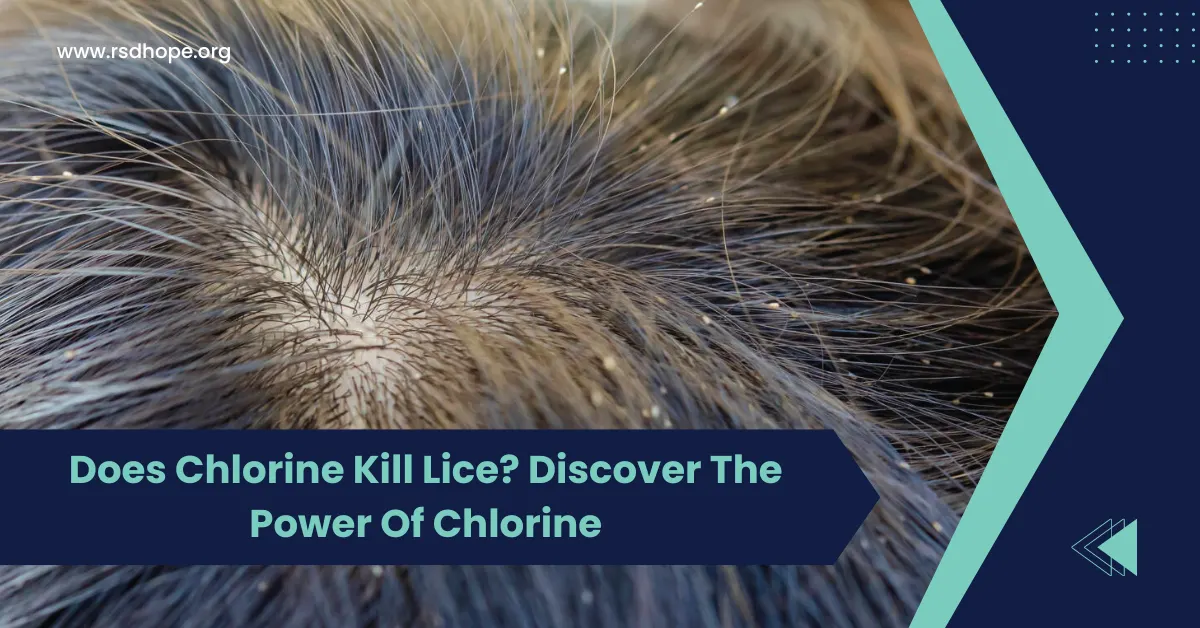Lice are tiny, wingless insects that feed on human blood and can infest the head, body, or pubic area. They spread easily through close contact with an infected person or by sharing personal items like hats, combs, or towels.
While various treatment methods exist, including over-the-counter and prescription medications, some people wonder if chlorine can effectively kill lice. In this comprehensive guide, we’ll explore the effectiveness of chlorine in treating lice infestations and provide tips on prevention and alternative treatment options.
Key Takeaways
- Chlorine can kill lice, but it may not be the most effective or safest treatment option.
- Preventing lice infestations involves avoiding close contact and sharing personal items with infected individuals.
- Over-the-counter and prescription medications are the most reliable treatment options for lice infestations.
Does Chlorine Kill Lice?
Chlorine, a common chemical found in swimming pools and cleaning products, can kill lice to some extent. When lice are exposed to high concentrations of chlorine for an extended period, it can penetrate their exoskeletons and cause death.
However, chlorine may not effectively kill lice eggs (nits), which have a protective shell that can withstand harsh chemicals. Additionally, using chlorine directly on the head can be harmful and cause skin irritation, eye damage, or respiratory issues if inhaled.
Also Read: How To Make Rosemary Water For Hair? Revitalize Your Hair Naturally
How to Prevent Head Lice?
Preventing lice infestations is crucial to avoid the discomfort and hassle of treatment. Here are some tips to minimize your risk:
- Avoid head-to-head contact with others, especially those with known lice infestations.
- Don’t share personal items like hats, combs, brushes, or towels with others.
- Regularly inspect your child’s head for signs of lice, such as itching, small red bumps, or visible lice or nits.
- Maintain good hygiene practices, like washing hair regularly and avoiding shared spaces like coat racks or lockers.
- If you suspect a lice infestation, act quickly to prevent spreading to others.
Risks of Using Chlorine on the Head
While chlorine can kill lice, using it directly on the head poses several risks:
- Skin Irritation: Chlorine can cause redness, itching, or a burning sensation on the scalp and skin.
- Eye Damage: If chlorine comes into contact with the eyes, it can cause pain, burning, or even temporary blindness.
- Respiratory Issues: Inhaling chlorine fumes can irritate the lungs and cause coughing, wheezing, or shortness of breath.
- Hair Damage: Exposure to high concentrations of chlorine can lead to dry, brittle, or discolored hair.
Given these risks, it’s essential to follow safety guidelines and consider alternative treatment options, especially for those with sensitive skin or respiratory conditions.
Treatment for Lice
The most effective and safe treatment options for lice infestations include over-the-counter and prescription medications. Some common treatments are:
- Permethrin (Nix): An over-the-counter lotion that kills lice and some eggs, applied to the hair and scalp.
- Pyrethrin (Rid): Another over-the-counter treatment that kills lice, but may require a second application after 7-10 days.
- Spinosad (Natroba): A prescription lotion that kills lice and eggs, applied to the hair and scalp.
- Ivermectin (Sklice): A prescription lotion that kills lice, applied to the hair and scalp.
When using these treatments, carefully follow the instructions on the packaging or as directed by your healthcare provider. After treatment, use a fine-toothed comb to remove any remaining lice or nits. Wash bedding, clothing, and other items that may have been in contact with the infested person in hot water to prevent re-infestation.
Conclusion
While chlorine can kill lice, it may not be the most effective or safest treatment option. Preventing lice infestations through proper hygiene and avoiding close contact with infested individuals is crucial.
If you or your child contract lice, over-the-counter or prescription medications are the most reliable treatment choices. Remember to follow treatment instructions carefully and take steps to prevent re-infestation. If you have concerns or your lice infestation persists after treatment, consult your healthcare provider for further guidance.
Read More: Nanoplastia Hair Treatment: Your Path to Healthy, Gorgeous Locks
FAQs
A: While swimming in a chlorinated pool may kill some lice, it’s not a reliable treatment method. Lice can survive underwater for several hours, and chlorine may not effectively kill nits.
A: Common signs of a lice infestation include itching, small red bumps on the scalp, and visible lice or nits on the hair shafts, especially behind the ears and at the nape of the neck.
A: While some home remedies claim to suffocate lice, they are not scientifically proven to be effective. Stick to proven over-the-counter or prescription treatments for the best results.
A: Treatment times vary depending on the specific medication used. Follow the instructions provided with your chosen treatment, and continue to check for lice and nits for several days after treatment to ensure they are gone.
Sources:
- American Academy of Dermatology. (2021). Head Lice: Diagnosis and Treatment. Retrieved from https://www.aad.org/public/diseases/a-z/head-lice-treatment

